Hall High Community Honors International Human Rights Day

Audio By Carbonatix
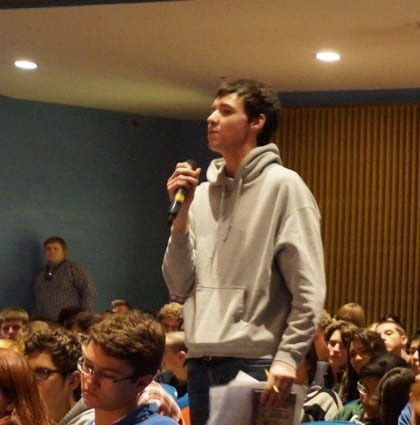
A Hall student asks a question during an International Human Rights Day panel discussion. Photo credit: Ronni Newton
Students and staff and West Hartford’s Hall High School spent International Human Rights Day, Wednesday, Dec. 10, 2014, focused on the topic of human rights through a series of workshops and discussions.
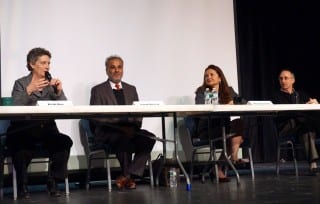
Panelists for a discussion on International Human Rights Day included (from left): State Sen. Beth Bye, Dr. Saud Anwar, Wanda Correa, and Bruce Putterman. Photo credit: Ronni Newton
By Ronni Newton
It was anything but “business as usual” at Hall High School on Wednesday, Dec. 10, as the entire community of students and staff altered the regular school day schedule and – organizers hope – altered some stereotypes at the same time by devoting the day to a discussion of human rights.
Every student started the day with an advisory homeroom session where they discussed the Universal Declaration of Human Rights and challenges involved in protecting those rights, and all ended the day back in advisory homeroom, where they brainstormed about short-term and long-term plans to support the advocacy of human rights at Hall and beyond.
The students will collaborate on written statements promoting human rights advocacy, and then compile those statements into a “digital quilt” that will later be shared with the community.
In between the advisory sessions, all students attended two workshops that they chose from a list of 19 available sessions. Topics included “Feminism 101,” “LGBTQ Issues,” “Representing a People – A Dialogue About Modern American Indian Society,” “Privilege – Exploring Race,” “What is Masculinity,” and more. The workshops were facilitated by adults from the Hall community as well as students. Some included guest experts.
The “Breaking Down Barriers” workshop held in the gym included stations where students navigated an obstacle course using a wheelchair, walker, or a cane for the blind – to provide a sense of what a day in high school is like for a students with special needs. That workshop also focused on the impact of using the “R-word” and how it affects students, friends, and families.
“The workshops really got people talking. Every workshop I went to was so engaging,” said Assistant Principal Shelley Solomon. The universal message of all of the workshops was to encourage students to stop using stereotypes and to be there for everyone, she said.
English Department Supervisor Catherine Buchholz said she was “most impressed” with the way the students handled themselves in the workshops, and how they were unafraid to speak out.
In addition to the workshop, all 1,470 Hall students attended a 90-minute panel discussion in the auditorium. There were actually two identical panel discussions held during the day, broken down by under- and upper-classmen, because the students can’t all fit into the auditorium at the same time.
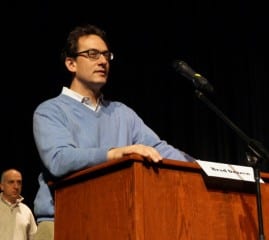
Brad Drazen, NBC Connecticut anchor and Hall parent, facilitated a panel discussion on International Human Rights Day. Photo credit: Ronni Newton
NBC Connecticut anchor Brad Drazen, who is also a Hall parent, facilitated the discussion. Panelists were State Sen. Beth Bye (parent of Hall graduates), Dr. Saud Anwar (physician and mayor of South Windsor), Wanda Correa (attorney, community advocate, and current Hall parent), and Bruce Putterman (West Hartford Board of Education member and West Hartford parent).
Each panelist shared a personal story of a human rights issue that impacted them personally, and panelists also answered questions submitted in advance by students as well as from students in the audience.
Bye said that she is pleased with the progress on issues of gay rights that has been made in Connecticut in the past decade. She said that Dec. 10, 2014, is the ninth anniversary of her civil union with Tracey Wilson, and the two purposely chose International Human Rights Day. They married in 2008.
Bye said she decided to run for state senate after hearing her predecessor used the term “these people” to refer to gays. “It’s really important not to have the words ‘these people’ in your head,” Bye said. And after years of checking the “other” box when asked about her marital status, now that her marriage is recognized throughout the country she said she is happy to now have all of the Federal benefits of marriage available to her family.
Anwar, a native of Pakistan who has lived in the United States since 1991, is a Muslim. However, even though his children were born in the U.S. and are “as American as anyone else,” Anwar told a story of his son’s reluctance to admit to being Muslim in a high school class discussion because he wanted to be “accepted by everyone” and his faith had led to bullying in middle school.
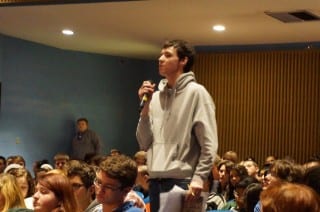
A Hall student asks a question during an International Human Rights Day panel discussion. Photo credit: Ronni Newton
“As the first Muslim mayor in Connecticut, and in New England, you get a lot of attention,” Anwar said. He uses that “light” to deflect attention to causes he believes in.
Correa, a Latina, spoke about the recent happenings in Ferguson and New York. “What’s most difficult is not just having to watch these events take place, but having the children have to watch them.”
Correa relayed a personal story of her husband, a Latino who is also an attorney, recently being stopped by a police officer in West Hartford. That time there was a legitimate reason, but she said he has been stopped numerous times and now knows the routine – “hands on the steering wheel … speak calmly and clearly,” eventually let the officer know he’s an attorney.
Correa tells her children to be sure they have their bags closed before walking into a store, just to be sure no one suspects them of stealing. “Staying safe is a reality for many of us,” she said. “I shouldn’t have to think of these things.”
Putterman said he hasn’t had to manage the magnitude of the struggles that the other panelists have, yet there are “big struggles and little struggles,” he said. Putterman and his wife have three children; one has special needs and one is adopted from Guatemala. He’s also Jewish, and although West Hartford has the highest percentage of Jews in the state, it doesn’t mean he doesn’t sometimes feel uncomfortable – especially around Christmas, he said.
Putterman said that when people have talked with him about sensitivity, his response is, “It’s not that we’re too sensitive, it’s that we’re not sensitive enough.”
One of the questions from the students was about the influence of technology on human rights issues. Correa said it’s both an asset and a detriment – an asset because an issue in one corner of the world can be known in another corner of the world. “As a result of the power of social media we’re all interconnected,” she said. However, “This does not take away the power of human interaction. There’s nothing like being able to look into the eye of another and have that conversation,” she said.
“A scalpel or knife in the hands of a murderer can kill you but in the hands of a surgeon can save you,” said Anwar. “Technology is as good as the people who use it.”
Bye said that technology, which is not going away, “puts a magnifying glass on society. You can use it to get more hateful or more loving.”
Drazen stepped away from his role as facilitator and also answered a question about the impact of the media on human rights issues. “In the media, issues are portrayed in a duality, but most are far more complex,” he said.
“Don’t ever trust just one source. Be hungry for more.” Drazen urged the students to get multiple perspectives on major issues, even from sources they might consider to be the “other” side. “The conversation is supposed to be uncomfortable, so seek out multiple sources to help you see.”
“What used to be ‘broadcast’ is now ‘narrowcast,'” said Anwar. “Try to separate news from opinion,” he said.
Putterman said that traditional media is on the decline while social media is having a rapid ascension as a means of relaying information. He urged the students to look deeper into issues through “long form” media such as news magazine features or books.
The panelists also responded to a question about what they wish they had known in high school, and one about labels.
The final question asked by a student in the audience was about whether there is a greater divisiveness in politics and the world today, or if it’s just the media’s portrayal.
Correa’s response perhaps summed up the intent of the day’s programming. “I do believe the country is more divided, and more partisan on many levels,” she said. “Show the world that these conversations can be had. Use your leadership to bring people together, despite and because of the differences,” she urged.
Following the panel discussion, Correa asked Hall Principal Dan Zittoun what the next step will be. “It’s not what’s next, but what’s already happening. Today is about ‘putting extra logs on the fire’ … it’s all continuous improvement,” he said.
Like what you see here? Click here to subscribe to We-Ha’s newsletter so you’ll always be in the know about what’s happening in West Hartford!


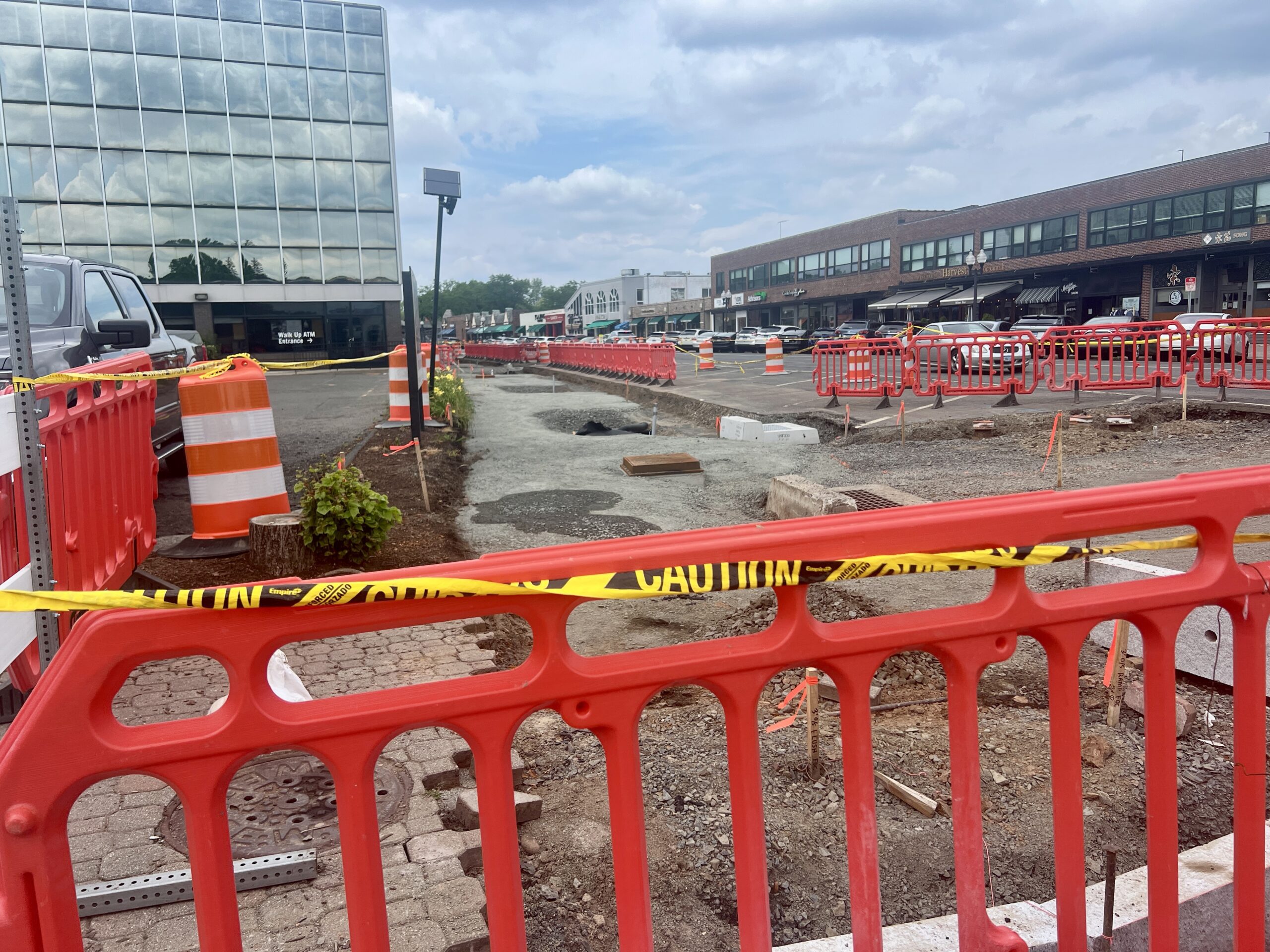
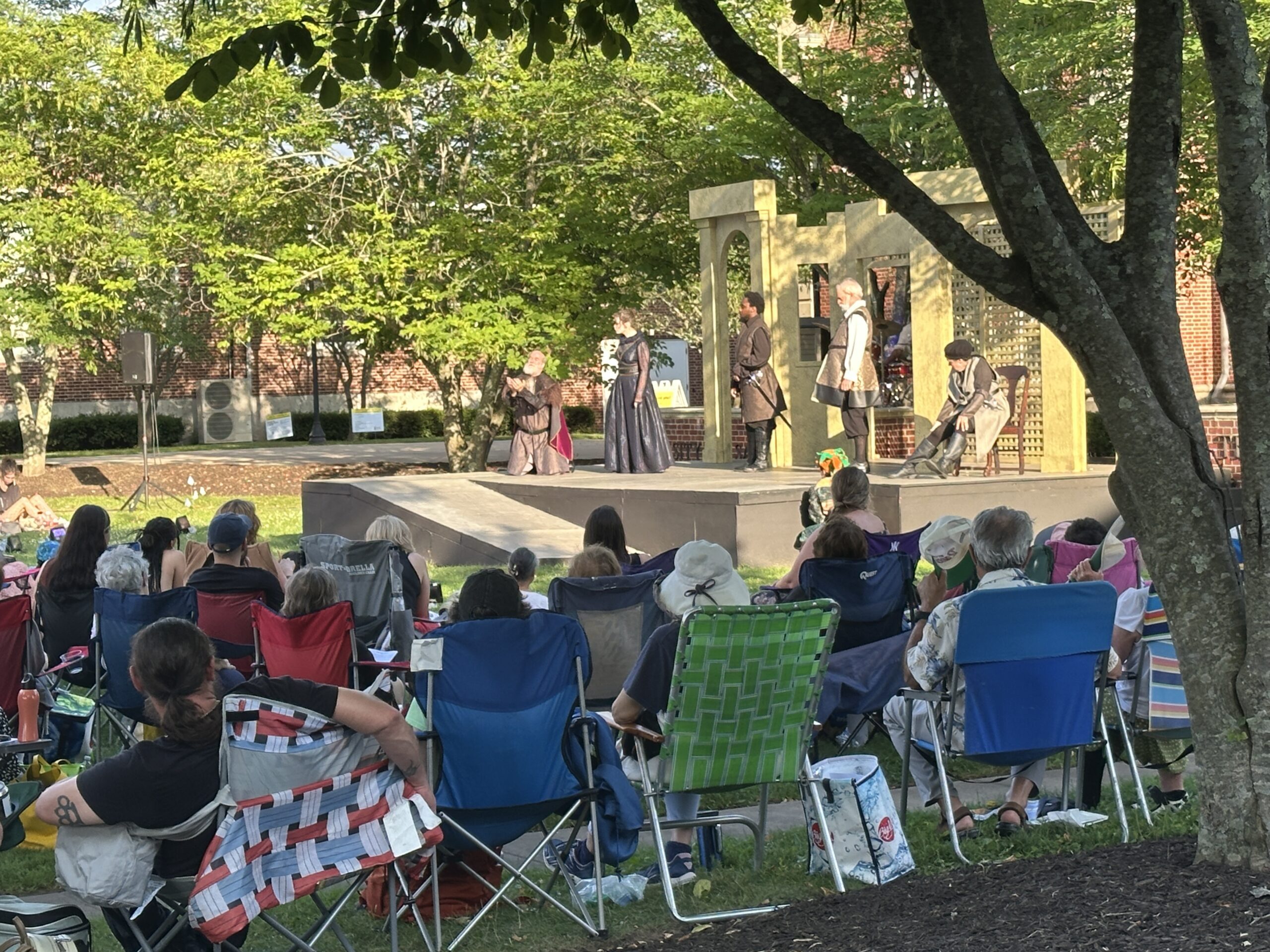
My student said the panel was impressive and the best part of his day.
[…] Hall High Community Honors International Human Rights Day […]